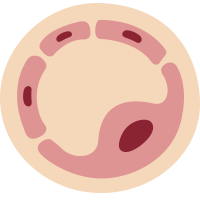
Endothelial Cell News
Endothelial Cell News is an online resource dedicated to the latest research studying the endothelium, blood vessels, and angiogenesis.
Extracellular Vesicles Containing circMYBL1 Induce CD44 in Adenoid Cystic Carcinoma Cells and Pulmonary Endothelial Cells to Promote Lung Metastasis
[Cancer Research] Researchers identified a circRNA derived from MYBL1 pre-mRNA that accompanied overexpression of MYBL1 in adenoid cystic carcinoma (ACC). Overexpression of circMYBL1 was correlated with increased lung metastasis and poor overall survival in ACC patients.
VEGF-Induced Nrdp1 Deficiency in Vascular Endothelial Cells Promotes Cancer Metastasis by Degrading Vascular Basement Membrane
[Oncogene] Scientists showed that the conditional medium from hypoxia-incubated cancer cells induces extensive Nrdp1 downregulation in human and mouse vascular endothelial cells by VEGF, which activated CHIP, followed by Nrdp1 degradation in ubiquitin-proteasome-dependent way.
LAGE3 Promotes Angiogenesis on Hepatocellular Carcinoma by Stabilizing VEGFA mRNA
[Biochimica Et Biophysica Acta-Molecular Basis Of Disease] Increased expression of LAGE3 cloud led to upregulated VEGFA secretion and angiogenesis in hepatocellular carcinoma. The mechanistic study revealed LAGE3 was required for the VEGFA mRNA stability.
Diosgenin Improves Post-myocardial Infarction Cardiac Function via HAND2-Induced Angiogenesis
[Biochemical And Biophysical Research Communications] Researchers revealed that diosgenin significantly improved cardiac function in a myocardial infarction mouse model, reducing cardiac fibrosis and cell apoptosis while promoting angiogenesis. Mechanistically, diosgenin upregulated the Hand2 expression, promoting the proliferation and migration of endothelial cells under hypoxic conditions.
Endothelial Cell Expression of a STING Gain-of-Function Mutation Initiates Pulmonary Lymphocytic Infiltration
[Cell Reports] To identify STING-expressing non-hematopoietic cell types required for the development of interstitial lung disease, investigators used a conditional knockin STINGV154M (VM) mutation model and direct expression of the VM allele to hematopoietic cells, fibroblasts, epithelial cells, or endothelial cells.
Vascular Endothelial Dysfunction Induced by 3-Bromofluoranthene via MAPK-Mediated-NFκB Pro-inflammatory Pathway and Intracellular ROS Generation
[Archives Of Toxicology] Disruption of vascular endothelial integrity and up-regulation of vascular endothelial permeability were induced by 3-BrFlu in a concentration-dependent manner through pro-inflammatory responses in vascular endothelial cells, namely, SVEC4-10 cells.
Vascular Mimicry as a Facilitator of Melanoma Brain Metastasis
[Cellular and Molecular Life Sciences] Scientists found that vascular mimicry density was elevated in melanoma brain metastases compared to paired extracranial specimens and was associated with tumor volume and central nervous system edema. Their studies indicated a relevant role of YAP and TAZ, two transcriptional co-factors scarcely studied in melanoma, in tumor cell-vasculogenesis and in brain metastasis.
The Endothelium: Gatekeeper to Lung Ischemia-Reperfusion Injury
[Respiratory Research] The authors highlight the more significant mediators of IRI-induced endothelial dysfunction discovered over the past decade including the extracellular glycocalyx, endothelial ion channels, purinergic receptors, kinases, and integrins.
Mitochondrial CypD Acetylation Promotes Endothelial Dysfunction and Hypertension
[Circulation Research] Researchers studied cyclophilin D (CypD) acetylation in patients with essential hypertension, defined a pathogenic role of CypD acetylation in deacetylation mimetic CypD-K166R mutant mice and endothelial-specific general control of amino acid synthesis 5 like 1–deficient mice using an angiotensin II model of hypertension.
Brain Endothelial GSDMD Activation Mediates Inflammatory BBB Breakdown
[Nature] Scientists found that activation of the pore-forming protein GSDMD by the cytosolic lipopolysaccharide (LPS) sensor caspase-11, but not by TLR4-induced cytokines, mediated BBB breakdown in response to circulating LPS or during LPS-induced sepsis.
Haplo-Insufficiency of Profilin1 in Vascular Endothelial Cells Is Beneficial but Not Sufficient to Confer Protection against Experimentally Induced Atherosclerosis
[Cytoskeleton] The authors investigated the impact of endothelial cell-specific partial loss of profilin1 expression in atherosclerosis development.
SARS-CoV-2 Infection Activates Inflammatory Macrophages in Vascular Immune Organoids
[Scientific Reports] The authors established vascular immune organoids from human pluripotent stem cells and examined the effect of SARS-CoV-2 infection.
Specific research topics covered in Endothelial Cell News include the roles of endothelial cells in the regulation of physiological processes, as well as their implications in tumor progression, cardiovascular disease, endometriosis, wound healing, tissue regeneration and other diseases and disorders. We also provide updates on the latest job postings and upcoming events, helping connect everyone within the endothelial cell research field.

 Cancer Stem Cell News
Cancer Stem Cell News Cell Therapy News
Cell Therapy News Dermal Cell News
Dermal Cell News Endothelial Cell News
Endothelial Cell News ESC & iPSC News
ESC & iPSC News Extracellular Matrix News
Extracellular Matrix News Hematopoiesis News
Hematopoiesis News Hepatic Cell News
Hepatic Cell News Human Immunology News
Human Immunology News Immune Regulation News
Immune Regulation News
 Intestinal Cell News
Intestinal Cell News Mammary Cell News
Mammary Cell News Mesenchymal Cell News
Mesenchymal Cell News Muscle Cell News
Muscle Cell News Neural Cell News
Neural Cell News Organoid News
Organoid News Pancreatic Cell News
Pancreatic Cell News Prostate Cell News
Prostate Cell News Pulmonary Cell News
Pulmonary Cell News
